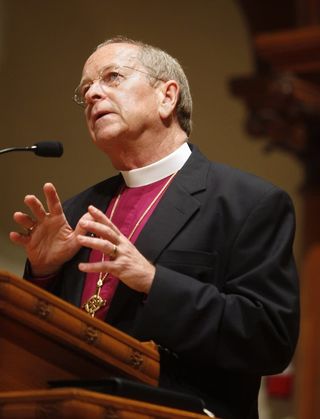Resilience
LGBTQ Faithful Defy Stereotypes, Find Profound Resilience
As the media hype religious homophobes, LGBTQ believers live out their faith.
Posted March 26, 2019
The words “gay” and “religion” aren’t usually paired together unless right-wing Christianists are reviling us once again. They regularly accuse us of causing natural disasters and social ills for which they blame scapegoats, rather than look to the fact-based world of science for an explanation.
The latest church-sponsored gay-bashing came from the United Methodists voting to continue their ban on anyone but heterosexuals from both marriage and the denomination’s ministry.
Judging from what we see in the news media, you may find it surprising to know that a high percentage of LGBTQ individuals actually consider themselves “people of faith.” Like many other human beings—whatever their sexual orientation or gender identity—they find that cultivating a spiritual awareness or religious faith provides a sense of meaning and purpose, key ingredients of resilience.
Media skew public perception
A 2012 GLAAD report on "missing voices" in mainstream media coverage of the LGBTQ equality movement made it clear that media’s over-reliance on antigay evangelical and Catholic commentators has created the false perception that “all” religions reject LGBTQ people and all of us likewise reject religion and spirituality.
GLAAD found that although evangelicals account for only 26 percent of the US population, evangelical organizations comprised 50 percent of all the religious organizations cited by the media. Evangelicals accounted for almost 40 percent of all the negative comments about LGBTQ people by religious identified spokespeople. Those speaking on behalf of the Roman Catholic hierarchy contributed another 12 percent.
Most pro-LGBTQ sources were presented without any religious affiliation—reinforcing the erroneous impression of a fierce wall of fire between “religion” and “gay.”
Getting to the truth
A 2015 Pew Research Center report, called America’s Changing Religious Landscape, found that an impressive 59 percent of lesbian, gay, and bisexual Americans (the study didn’t assess transgender individuals) consider themselves “people of faith”—the largest percentage (48 percent) of whom are Christian. Another 11 percent identify with faiths other than Christianity, particularly Judaism, Islam, and Buddhism.
How can it possibly make sense that nearly two-thirds of the men and women most frequently demonized by those allowed to speak for “people of faith” consider themselves to be people of faith—particularly when, as the Pew report found, fewer Americans identify with organized religions or claim any religious affiliation at all?
One possible explanation is that those who do so are inclined toward the more traditional values that religion tends to uphold, including marriage, family, and community.
Another explanation lies in the experiences and insights of America’s LGBTQ religious leaders. When you watch and listen to them—rather than talk about them—you find profound faith and amazing resilience.
The moral heart of the ‘homosexual agenda’
LGBTQ people of faith, regardless of their particular affiliation or religious labels, consistently affirm pluralism, community, and a shared commitment to doing justice and showing mercy—precisely the values organized religions espouse even if they are not always practiced. It's not coincidental that these values also lie at the core of the LGBTQ equality movement.
Sharon Kleinbaum, senior rabbi for Congregation Beit Simchat Torah, in Manhattan, the nation’s largest LGBT-focused Jewish congregation, recalled ministering to gay men with AIDS—often likened to modern lepers. “When I came here [in 1992],” she said in an interview for my book Stonewall Strong, “I had to fight with Jewish funeral homes to bury anyone [who died from AIDS] with dignity. They were burying them in plastic body bags, which is against Jewish law and custom.”
Forty percent of CBST’s male members died in the HIV-AIDS epidemic.
Kleinbaum described another experience with one of the men that brought the light of faith into a very dark place. “I did a wedding, before it was legal, for a congregant who was dying from AIDS,” she said. “He couldn’t get out of bed and his partner sat next to him on his hospital bed. A deli platter was brought into the hospital room. He died a few days later. The dignity and love and sense of humanity in that hospital room was spectacular. It was so inspiring, such a hopeful feeling of being powerful, not victims.”
Beginning in the 1980s, Rev. Carl Bean crisscrossed the city of Los Angeles by bus and subway, ministering to black gay and bisexual men dying from AIDS. He further lived his faith by forming the Unity Fellowship in South Central LA, the first Christian denomination for LGBT people of color, and its Minority AIDS Project, the nation’s first HIV-AIDS service organization run by and for people of color.
“I really believe resilience for me, faith for me, has far more to do with practical experience,” said Bean in our interview for Stonewall Strong. “Seeing the practical experience of the faith idiom lived out. That is what makes me resilient. I don’t think you just get that from hearing Bible verses. We had to see people live their faith experiences.”
Rev. Mel White flashed into public awareness like a bolt from the heavens in 1994, when the former ghostwriter for the Revs. Jerry Falwell, Pat Robertson, and Billy Graham came out as a gay man. White’s fellow evangelicals vilified him in the vilest of terms.
I asked him how he had survived the slander and attempted character assassination that followed his coming out—coming as it was from the evangelical world, the right wing, that had been his world all his life. He pointed out that the term evangelical, and even the word Christian itself, have become so fraught that he no longer finds them helpful to describe his faith. Instead, he chooses to describe himself simply as “a mediocre follower of a first-century Jewish carpenter.”
White attributes his own resilience to a “very personal relationship with Jesus.” But not the Jesus of the “jeee-zus” sort. The reverend’s faith is deeply rooted in an understanding of social justice that goes back to, well, Jesus. He can’t abide injustice—precisely like the first-century Jewish carpenter himself.
On the home page of White’s organization, Soulforce is a clue as to how differently he understands his own Christian faith compared to those who consider it “Christian” to deny LGBTQ believers their fully equal humanity and spirituality. “Smashing Christian Supremacy,” it says of the group's mission.

After his November 2003 consecration as the Episcopal bishop of New Hampshire, Rt. Rev. V. Gene Robinson became a lightning rod for every homophobic attack imaginable. As the first openly gay bishop in the global Anglican communion, Robinson faced slanderous attacks from fellow bishops, even death threats. He had to wear a bulletproof vest and had twenty-four-hour bodyguards.
Yet in our interview for Stonewall Strong, Robinson said, “If you are absolutely certain of God’s love, everything else turns out to be very small potatoes.”
I asked Robinson how he would convey this kind of faith and resilience to younger gay men. First of all, he said, “Don’t ever confuse the church and God. The church often gets it wrong and God never does.”
Second, and most importantly, Robinson said resilience for a person of faith comes down to one simple, profound truth. “If you are certain of God’s love for you,” he said, “there is almost nothing you can’t do.”
That's a lesson any person of faith should be able to relate to. Even the straightest and narrowest.




